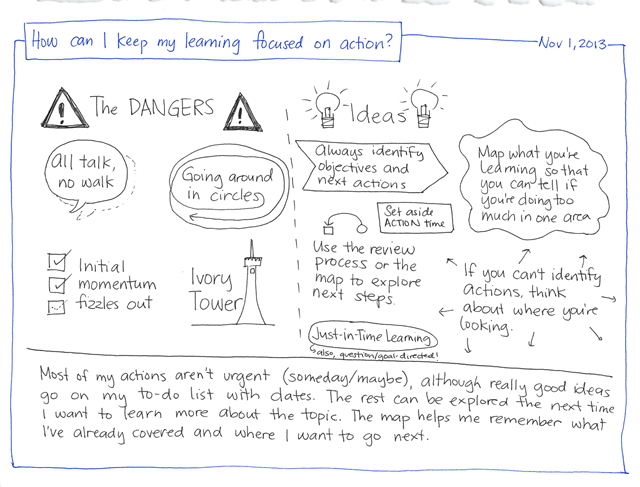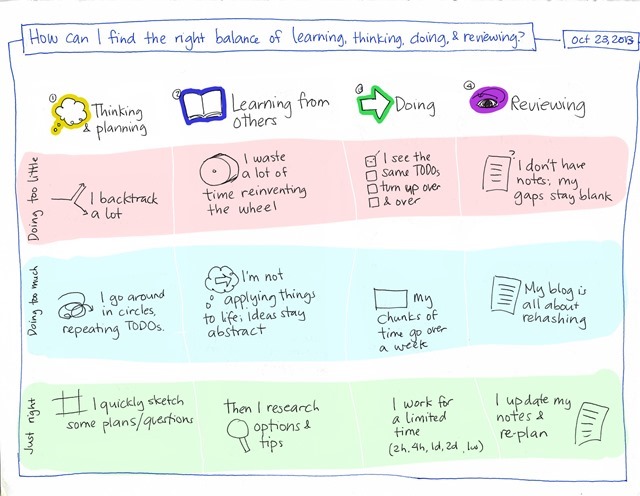Adjusting to less focused time
| kaizen, learning, parentingIt feels like I've had much less focused time over the past two months. Weaning, sickness, and A-‘s bigger emotions all needed more patience and energy. I've been prioritizing sleep and household maintenance over things like staying up to consult or write. On the plus side, we've gotten back into the rhythm of preparing meals for the week, and cleaning the house is a little easier now.
How can I adapt if this is my new normal?
I've been setting more firm boundaries (myself, bedtime routines, etc.), and that's been working reasonably well. I've also adjusted my plans and made sure not to commit to more consulting than I could do.
I'm not keen on making videos a regular part of her day, since we don't want to add another cause for conflict. I considered creating space by having a babysitter come over for 3-4 hours. A- is still not keen on the idea, though, and I can see how we both benefit from the time we spend with each other.
So the main thing to do, I think, is to rejig my plans in order to make the most of the constraints. What do I want to learn even without lots of focused sit-down time? How do I want to grow?
- Equanimity: This lets me turn A-‘s tantrums into learning opportunities. I can practise appreciating her and this life, especially when we're in the thick of things. Taking care of our basic needs gives me the space to be patient and kind when A- needs me to be, and it's good practice in anticipating and heading off challenges. I tend to be firmer than W- is, so I can work on noticing when a little kindness or flexibility might help a lot when A- and I are on our own.
- Household maintenance: I want to take on more chores, help A- get involved, and become more effective. This is also a good opportunity to practise noticing things. I can learn things from W- and from the Internet.
- Thinking, learning, and improving in short bursts: I want to get better at using little pockets of time. Drawing and dictating might be good techniques to explore further.
- Mindfulness and being present: I want to get better at being there for A- instead of letting myself be distracted. I want to get better at enjoying now. I also want to balance that with thinking about and doing my own things. I can start with a few magic moments a day, and then expand from there.
- Playfulness and creativity: I like the way W- interacts with A-. It might be interesting to practise playfulness and creativity, especially since A- can be my play partner and guide. I can pick up ideas at the drop-in centres, and sometimes reading helps.
These things are less obviously rewarding than, say, figuring out a clever solution for a client problem or coming up with a neat Emacs hack and blogging about it. But they're worthwhile things to learn anyway.
How can I make my learning more intentional? It might be interesting to make myself a list of things to focus on or try out, and then try one at time while keeping an eye out for other things that are relevant to the situation. For example, I could have a day of involving A-‘s toys in tasks, then see how that resonates with A-.
How can I make my learning more visible? I think journal entries will help a little. Sometimes A- insists that I stay close while she's sleeping, so that might be a good time to write. I can draw thoughts while waiting for A-, too, which is a good way to model writing and drawing. Paper seems to work a little better than drawing on my phone, although maybe that's a matter of practice. I don't have a good workflow for dealing with notes yet, but I can archive pictures for now and deal with them as mostly transitory thinking aids.
I'll probably have lots of focused time later on. Crunch time isn't forever. Even if I may need to start over, I'm not too worried. I think I'll be able to get the hang of things again.
In the meantime, we're mostly set up for playing and doing chores at home. Once we recover from this cold and cough, I think our daily rhythm will involve drop-in centres as well as home time. I've got things to learn and ways to grow. I can do this, even though it's a bit different from what I'm used to.
Life changes. It's good to adapt.













